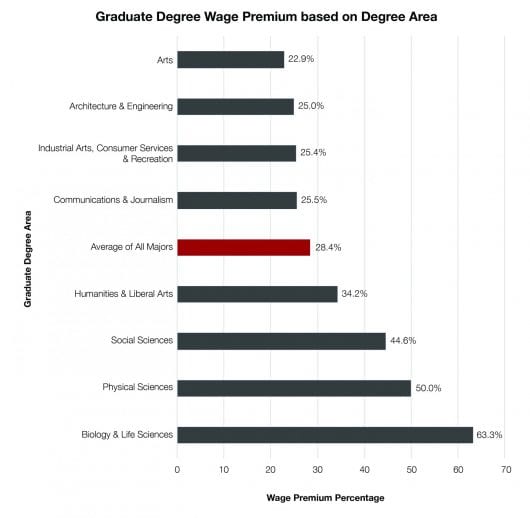Going to graduate school is an opportunity for freshly-minted undergraduates to expand their knowledge and expertise in their field. It is, however, an expensive investment.
Students looking to attend graduate school have a lot of factors to weigh, both monetarily and experientially. One of those considerations is how much a graduate degree will bolster their career prospects and the salary they receive at their first job.
The major group the degree is in can have a large impact on how useful the degree will be to securing a better wage, according to a study conducted by Georgetown University’s Center on Education and the Workforce. The study puts individuals into groups based on their undergraduate majors and compares the undergraduates who go on to earn a graduate degree against those who do not.
Peterson’s, an online service that specializes in preparing students for testing and applying to graduate schools, said in its guide for potential graduate school students that salary is a common motivator.
“This is a popular reason why people go to grad school,” the guide said. “However, it should not be the only reason, since getting a grad degree is a very serious commitment.”
On average, across all majors, securing a graduate degree nets a college-educated worker between ages 25 and 29, a 28.4 percent “wage premium” — that is, they make 28.4 percent more than someone in the same field with just a bachelor’s degree.
Some major groups, however, paint a very different picture compared to the average. For example, the top four majors, in terms of wage premium, all come in at over 34 percent while the bottom four all come in at under 26 percent.
The Peterson’s guide notes that an initial wage premium might not always be the best measure, for the payoff of a graduate degree is not always immediate.
“While obtaining a graduate degree does not necessarily always lead to a high-paying job right away, it can open up opportunities for future promotions,” the guide said.
The major group that best rewards graduate degree holders is biology and life sciences, which has a 63.3 percent wage premium. Within the group, zoology has the highest wage premium at 79 percent with graduate degree holders making $104,000 on average while bachelor’s degree holders make $58,000.
Rounding out the top four major groups are physical sciences, social sciences and humanities and liberal arts, respectively.
While some major groups are well above average in wage premium, this means that some must come in below the average and do not offer the salary bump so many seek.
“Getting a grad degree does not necessarily mean you’ll get offered a job with a much higher salary than you are getting now,” Peterson’s guide said.
On the other end of the spectrum, the arts major group offers graduate degree holders the lowest wage premium. Within the group, film, video and photographic arts majors have the lowest wage premium at 18 percent with graduate degree holders bringing in $60,000 and bachelor’s holders making $51,000.
Completing the bottom four major groups — from bottom up — architecture and engineering, industrial arts, consumer services and recreation and communication and journalism.
Regardless of the motivation to continue into graduate school, it is a huge life commitment and Peterson’s offered a cautionary question for those that might consider it only as a salary booster.
“Even with a higher salary, how quickly will that offset tuition loans and the negative cash flow due to not earning while studying?”



